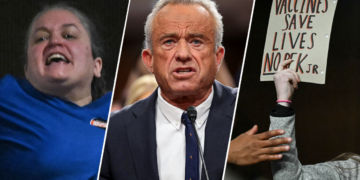Over a career spanning more than 30 years in real estate, the real estate tycoon’s companies have been involved in more than 4,000 lawsuits.
Surprise?
The New York court ruling that singles out Donald Trump, his family and associates as responsible for “persistent and repeated fraud” was hardly a surprise to anyone who has closely followed the history of the now former president and potential Republican presidential candidate.
Judge Arthur Engoron may order the dissolution of the Trump Organization and place it under judicial control pending the assessment of fines that could reach $250 million for habitually lying to the IRS and potential clients.
It is a blow to Trump’s presidential campaign, where he currently holds a considerable lead over his rival candidates for the Republican nomination, but one that will also firmly place him in his role as a “victim” persecuted by the system and will probably make him more popular among some sectors predisposed to believe him.
Trump claims to be the subject of a witch hunt, but beyond ideologies or preferences, the real surprise — though perhaps not a true surprise — is that it is happening at all: Over a career of more than 30 years in real estate, his companies have been involved in more than 4,000 lawsuits.
When reporter Maggie Haberman published her biography “Confidence Man: The Making of Donald Trump and the Breaking of America” in October 2022, she noted that, “The world of New York developers was filled with shady figures and rife with backbiting and financial knife fighting; engaging with them was often the cost of doing business. But Trump nevertheless stood out to the journalists covering him as particularly brazen.”
One of Trump’s mentors at the time was lawyer Roy Cohn, who was also legal counsel to New York Mafia families, and the man from whom he learned a strategy that will no doubt be deployed in the coming months: Never give up, always countersue, and always claim victory no matter how far in the hole you are.
Trump’s first reaction was to attribute the court decision to his self-proclaimed status as the leading candidate for president of the United States.”
The former president has never stopped at much to achieve his aims, whether as a businessman who went bankrupt at least three times before reaching the White House, or for almost three years now, by maintaining, without presenting any evidence, that the election he lost in 2020 was a fraud.
But the New York case is just one part of Trump’s legal troubles. In the coming months, he will face trial over attempts to pressure state officials to alter election results in Georgia; over his role in the Jan. 6, 2021, assault; and over his handling of classified documents that he failed to return at the end of his presidency.
But it remains to be seen whether all these cases will dent Trump’s popularity, and thus his chances of being elected in November 2024, or whether they will provoke violence from the former president’s most extreme supporters.
Shop For Night Vision | See more…
Shop For Survival Gear | See more…
-
Sale!

Quick Slow Release Paramedic Survival Emergency Tourniquet Buckle
Original price was: $14.99.$7.99Current price is: $7.99. Add to cart -
Sale!

Stainless Steel Survival Climbing Claw Carabiner Multitool Folding Grappling Hook
Original price was: $19.99.$9.99Current price is: $9.99. Add to cart -
Sale!

Japanese 6 inch Double Edged Hand Pull Saw
Original price was: $19.99.$9.99Current price is: $9.99. Add to cart
















































